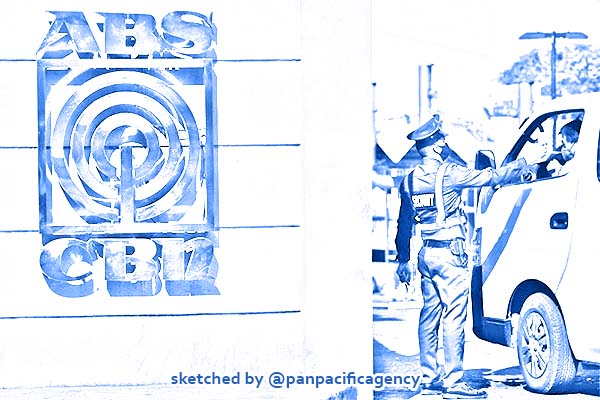Philippines’ ABS-CBN closes regional stations

A guard passes logo of ABS-CBN at the network’s compound, a day it was ordered shut by National Telecommunications Commission, May 6, 2020. The STAR/Michael Varca. Sketched by the Pan Pacific Agency.
MANILA, Sep 1, 2020, AFP. Anchor Dhobie de Guzman has been the face of a popular news show in the northern Philippines for more than a decade. Now the closure of his regional station – and dozens of others countrywide – has left him out of work, The ASEAN Post reported.
He is among hundreds of journalists to lose their jobs at ABS-CBN as the broadcasting giant – a critic of President Rodrigo Duterte – slashes its operations after advertising revenues were ravaged by the loss of its free-to-air licence in May.
The closure of 53 regional television and radio stations that broadcast in six languages will deprive millions of Filipinos of their main source of local news and entertainment.
“It’s painful,” de Guzman, 43, told reporters last Friday after presenting the final “TV Patrol North Luzon” in a studio 240 kilometres (150 miles) from the capital Manila.
“You do your job responsibly, you do your share to change the life of ordinary people, then at the end of the day you lose your platform to do that.”
Congress last month rejected ABS-CBN’s application for a new 25-year franchise and a Supreme Court petition over the issue was dismissed.
ABS-CBN, which is owned by the wealthy Lopez family, has broadcast continuously since 1953 except between 1972 and 1986 when it was seized by dictator Ferdinand Marcos – who Duterte admires.
Duterte has a history of clashing with media outlets critical of his policies, including his controversial drug war that has killed thousands of people.
While he has denied any involvement in Congress’s decision to reject ABS-CBN’s application, he had previously pledged to block its licence renewal.
In the months since losing its free-to-air permit, ABS-CBN has kept showing many of its popular news and drama programmes on cable TV and online.
But much of the advertising revenue it used to rake in has been wiped out, forcing the broadcaster to dramatically cut costs.
“Unfortunately, (digital advertising revenue) is not at the same level as broadcast, so that’s where the challenge is nowadays,” said ABS-CBN news and current affairs boss Regina Reyes.
After the closure of the regional stations on Friday, more parts of the network will be shuttered on Monday and many of its stars are expected to move on.
Thousands of jobs – including staff and contractors – could be lost, ABS-CBN warned previously.
‘Black Day’
For decades, ABS-CBN’s regional network has played a vital role in broadcasting information on natural disasters, such as typhoons, and health crises – including the coronavirus pandemic – to isolated communities that have little or no internet access.
For many, it is their only source of news.
Fishermen in some regions have long relied on their local broadcaster to know if it was safe to go out to sea, said Reyes.
“Not everyone has access to the internet, to radio or newspapers,” said Micaella Ilao, a TV reporter in Baguio.
“Removing (TV broadcasters) deprives the people of the privilege to receive proper information.”
The Foreign Correspondents Association of the Philippines has described the closure of ABS-CBN’s regional stations as a “black day for independent media” in the country.
“It’s an avoidable national tragedy, inflicted by the very people who should protect Filipinos from all adversity,” it said.
ABS-CBN is allowed to file a fresh petition, but its success would require members of Congress, dominated by Duterte allies and whose terms expire in 2022, to change their minds.
For now, they are mourning the loss of their network.
“It’s not just a channel… it’s a relationship, a connection that has been lost,” said Stanley Palisada, who was head of the regional news group.
“You become the medium of preference for people, for the local community, to complain, to ask for help in reaching out to the government officials and (entities) who may have the solutions to their problems.”